Career
African American Women Who Made U.S. Military History
Published
6 years agoon
By
BLAQER Media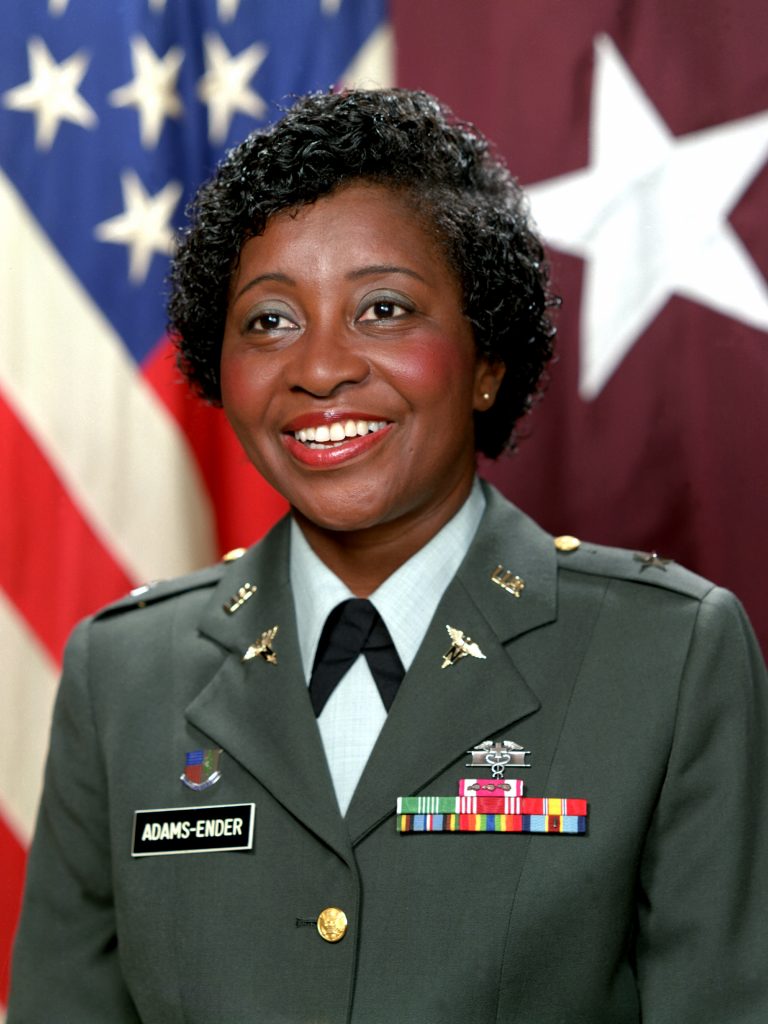
Whether it’s defending our country on the front lines or providing support to U.S. soldiers and civilian employees, African American women have made significant accomplishments in the Army.
Women’s Memorial compiled a list of trailblazers that helped paved the way for some of today’s Army leaders.
1st Lt. Nancy C. Leftenant
In March 1948, 1st Lt. Nancy C. Leftenant became the first black woman to become a member of the Regular Army Nurse Corps after joining the Reserve Corps in February 1945.
Margaret E. Bailey

Margaret E. Bailey
In 1964, Margaret E. Bailey, Army Nurse Corps, was the first nurse to be promoted to lieutenant colonel. In 1970, she went on to become the first black nurse to hold the rank of colonel.
Capt. Clara Adams-Ender

Brig. Gen. Clara L. Adams-Ender (Wikimedia Commons)
In 1967, Capt. Clara Adams-Ender became the first female in the U.S. Army to qualify for and be awarded the Expert Field Medical Badge. In 1976, Lt. Col. Clara Adams-Ender became the first woman in the U.S. Army to earn the Master of Military Art and Science degree from the Army Command and General Staff College at Fort Leavenworth, Kansas.
Command Sgt. Maj. Mildred C. Kelly

Command Sgt. Maj. Mildred C. Kelly (armyupress.army.mil)
In 1972, Mildred C. Kelly became the first black female sergeant major in the U.S. Army.
S. Sgt. Joyce B. Malon
In 1974, S. Sgt. Joyce B. Malone became the first black woman to earn airborne wings in the U.S. Army Reserves.
Brig. Gen. Hazel W. Johnson-Brown

Brig. Gen. Hazel W. Johnson-Brown
In 1979, Brigadier General Hazel W. Johnson-Brown became the first black woman general officer and the first black chief of the Army Nurse Corps.
Irene Trowell-Harris

Irene Trowell-Harris (Image: www.va.gov)
In 1987, Irene Trowell-Harris became the first black female general officer in the National Guard.
Brig. Gen. Marcelite Harris
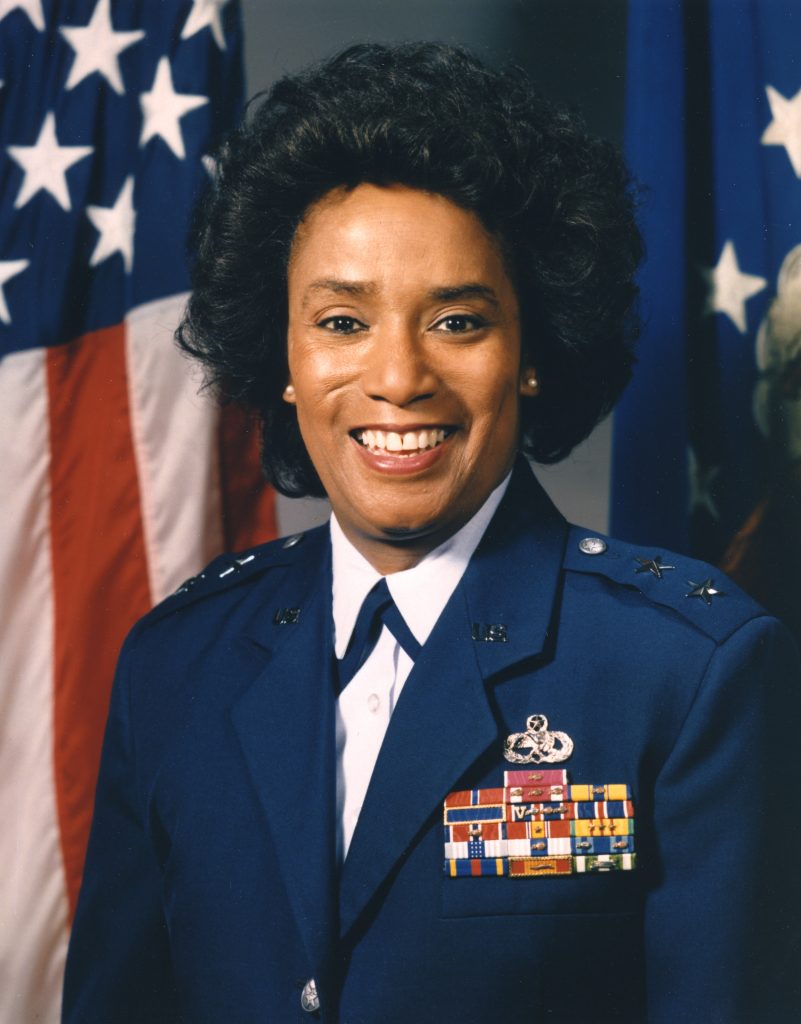
Ret. Major General Marcelite J. Harris, USAF Wikimedia Commons)
In 1995, Brig. Gen. Marcelite Harris, USAF, was promoted to major general, the first black woman to attain this rank.
U.S. Army Sgt. Danyell Wilson

U.S. Army Sgt. Danyell Wilson (Image: Awm.lee.army.mil)
In 1997, U.S. Army Sgt. Danyell Wilson became the first black woman to earn the prestigious job of guarding the Tomb of the Unknowns at Arlington National Cemetery.
Edwina Martin, Fannie Jean Cotton, and Evelyn M. Brown
In 1951, Edwina Martin of Danville, Virginia; Fannie Jean Cotton of Jackson, Michigan; and Evelyn M. Brown of Shreveport, Louisiana were the first three black women commissioned as officers (second lieutenants) in the Air Force. All three graduated from the Air Force Officer Candidate School at Lackland Air Force Base, Texas.
In 1969, Capt. Diane Lindsay, Army Nurse Corps, was the first black nurse to receive the Soldier’s Medal for Heroism.
The post African American Women Who Made U.S. Military History appeared first on Black Enterprise.
You may like
-
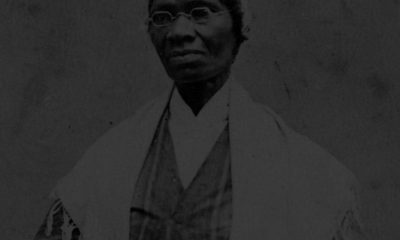

The Life and Legacy of Abolitionist and Activist Sojourner Truth
-


15 Top Civil Rights Songs That Promote Freedom and Justice
-


BAEcation: Top 5 Places You Should See Together
-
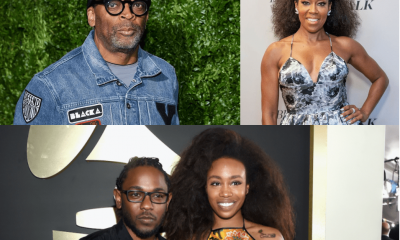

“Black Panther,” “Black KkKlansman,” Regina King, Spike Lee and More Nominated for 2019 Academy Awards
-
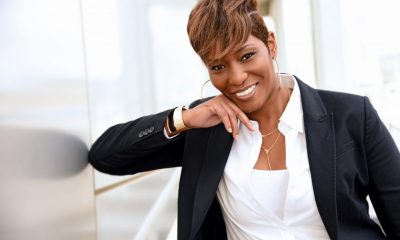

Risha Grant: Black Women Need Allies in the Workplace
-
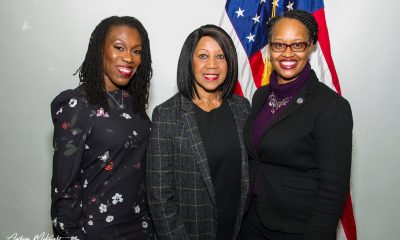

NJ Assemblywoman Angela McKnight and Financial Blogger Tiffany Aliche Create Bill to Teach Middle Schoolers Money Management
Career
First Black Man Elected President of the American Nurses Association (ANA)
Published
4 years agoon
April 9, 2020
Ernest Grant, PhD, RN, FAAN, President of the American Nurses Association

A distinguished leader, Dr. Grant has more than 30 years of nursing experience and is an internationally recognized burn-care and fire-safety expert. He previously served as the burn outreach coordinator for the North Carolina Jaycee Burn Center at University of North Carolina (UNC) Hospitals in Chapel Hill. In this role, Grant oversaw burn education for physicians, nurses, and other allied health care personnel and ran the center’s nationally acclaimed burn prevention program, which promotes safety and works to reduce burn-related injuries through public education and the legislative process. Grant also serves as adjunct faculty for the UNC-Chapel Hill School of Nursing, where he works with undergraduate and graduate nursing students in the classroom and clinical settings.
Grant is frequently sought out for his expertise as a clinician and educator. In addition to being a prolific speaker, he has conducted numerous burn-education courses with various branches of the U.S. military in preparation for troops’ deployment to Iraq and Afghanistan. In 2002, President George W. Bush presented Grant with a Nurse of the Year Award
for his work treating burn victims from the World Trade Center site. In 2013, Grant received the B.T. Fowler Lifetime Achievement Award from the North Carolina Fire and Life Safety Education Council for making a difference in preventing the devastating effects of fire and burn injuries and deaths within the state.
An active participant in professional organizations, Grant is a past chair of the National Fire Protection Association board of directors and served as second vice president of the American Burn Association board of trustees. He also holds membership in Sigma Theta Tau and Chi Eta Phi. Grant served as president of the North Carolina Nurses Association from 2009-11. In 2002, ANA honored Grant with the Honorary Nursing Practice Award for his contributions to the advancement of nursing practice through strength of character, commitment, and competence.
Grant holds a BSN degree from North Carolina Central University and MSN and PhD degrees from the University of North Carolina at Greensboro. He was inducted as a fellow into the American Academy of Nursing in 2014. He is the first man to be elected to the office of president of the American Nurses Association.
Career
Fortune 500 Company Corporate Board Diversity at All-Time High
Published
6 years agoon
January 18, 2019
A new report from the Alliance for Board Diversity (ABD) and Deloitte, reveals that women and people of color represent 34% of all corporate board seats in Fortune 500 companies—placing board diversity at an all-time high.
Here are some key findings from the study:
-Black woman gained 32 board seats in 2018, an increase of 26.2% from 2016.
-Black men gained 26 board seats in 2018, an increase of 8.5% from 2016.
-Black and Asian women achieved the largest increase in board seats; black women at a 44.8% increase, and Asian women at a 30.8% increase.
-Companies are increasingly re-appointing minority board members to their boards rather than seeking out new directors.
“The increase in boardroom diversity over the last two years is encouraging, but we must not overlook that Caucasian/White men still hold 66% of all Fortune 500 board seats and 91.1% of chairmanships on these boards,” said Linda Akutagawa, chair for the Alliance for Board Diversity and president and CEO, LEAP (Leadership for Asian Pacifics).
“While progress has been achieved, there is still much more work to do,” said Deb DeHaas, vice chairman and national managing partner, Deloitte Center for Board Effectiveness.
‘Wokeness’ in the Boardroom
Corporate America has been responsive to the wave of activism, particularly across social media, in regards to racism, sexism, economic inequality, and various other societal ills. Last year, Nike interjected itself into the heated debate over NFL players kneeling during the national anthem pre-game, to protest police brutality. The athletic apparel company made the symbol of the kneeling movement, Colin Kaepernick, a star in one of its ad campaigns.
The risk of offending customers who disagree with protesting on the field seemed to be worth taking. Nike’s sales increased 31% after the Kaepernick ad backlash.
Recently, Gillette, a Procter & Gamble brand, released an ad in line with the #MeToo movement, urging men to take responsibility for sexist behavior of other men. The ad is inciting both praise and outrage.
It’s not yet known how the controversial ad will affect P&G’s bottom line; the company is set to release its Q2 earnings next week (but so far, Wall Street speculation is favorable).
Burger King is the latest company to wade into political waters after posting a tweet poking fun at a misspelled tweet of Donald Trump’s.
due to a large order placed yesterday, we’re all out of hamberders.
just serving hamburgers today.— Burger King (@BurgerKing) January 15, 2019
CNN coined this ad trend “woke advertising.” This “wokeness” has presumably made it into the corporate boardrooms as the growing diversity board diversity numbers seem to evidence.
Despite Spate of Black Executive Board Appointments, Challenges Persist
A number of high-profile black executives have been appointed to the boards of some of the world’s largest companies. Last November, Nike announced the appointment of John W. Rogers, the CEO and founder of Ariel Investments L.L.C. to its board. Retired AMEX CEO Ken Chenault sits on the boards of Facebook and Airbnb. Edith Cooper, the executive vice president and global head of human capital at Goldman Sachs was added to Silicon Valley company Slack’s board.
As progress is made, challenges remain. One issue is that most board appointments come from the C-suite level and from the pool of corporate CEOs, in particular. The number of black CEOS at the corporate level has shrunk in recent years. Chenault actually discussed this issue with Black Enterprise in a recent interview.
“We have a long way to go,” said Chenault. “As I’ve said publicly, I think it’s embarrassing that the number of African American CEOs has actually been reduced from eight years ago. That’s a serious problem. From an African American perspective, we are underrepresented. We can talk all the theories we want. People talk about the complexity of this issue. I know that there are very qualified people. They just haven’t gotten the opportunity.”
While it’s important to celebrate the achievement made in diversifying American corporate boards, there is still the need to build up the pipeline of qualified black executives that can ascend to the C-suite.
Career
Risha Grant: Black Women Need Allies in the Workplace
Published
6 years agoon
January 10, 2019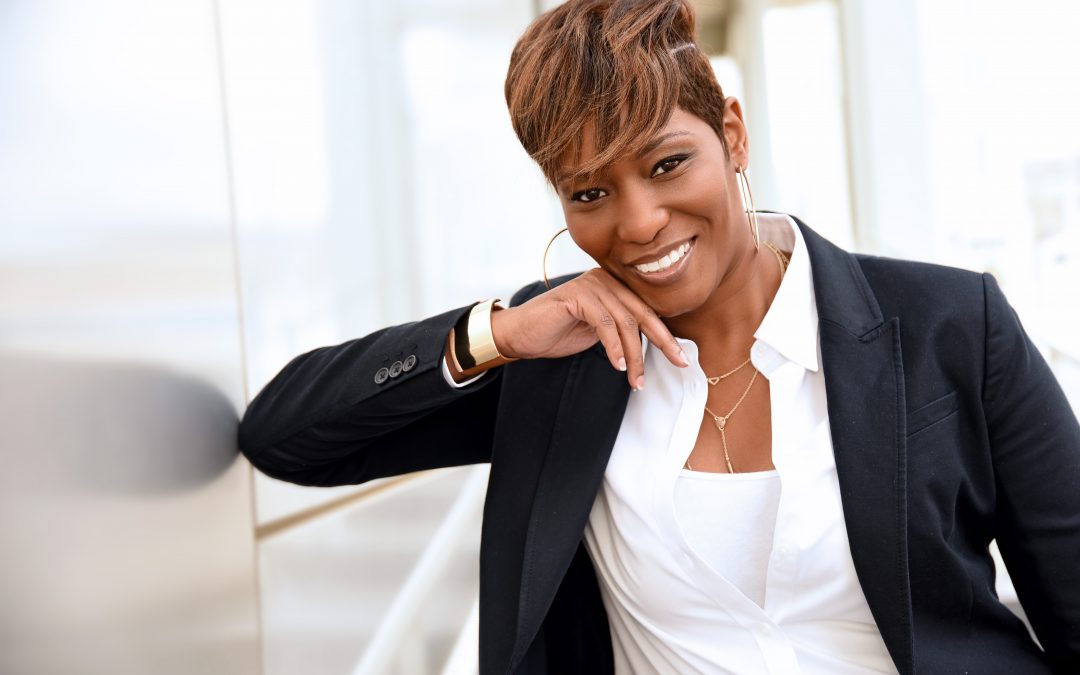
Risha Grant, the founder and CEO of Risha Grant L.L.C., an award-winning diversity and inclusion consulting and communications firm, recently posted a thought-provoking and provocative question on her Facebook page:
“What do Black people do that irritate White people?”
The responses from white people evoked counter-responses from black folk ranging from seething outrage to an appreciation for this open dialogue.
However, Grant is not simply being a provocateur. For the past 18 years, she has helped major corporations tackle their people problems and solve their diversity and inclusion issues. Now she wants to help you form the relationships you need by equipping you with tools to build allies.
In an exclusive interview with Black Enterprise, Grants speaks about how black women can tap into their power and eliminate what she has coined Bias Synapse, easily remembered as BS, in the workplace.
The Foundation of Allyship
Black Enterprise: Why is building allies at work critical for black women?
Risha Grant: Black women are commonly and unfairly stereotyped as angry and uncompromising. Building a support system of allies is critical in keeping those misconceptions in check. Additionally, building authentic relationships with other co-workers can help you to excel simply because these allies will understand, support, and speak up for who you are and how you operate. From a collaborative standpoint, working with allies allows others to experience your work ethic, creativity, and problem-solving ability. This will provide your allies with the knowledge needed to tout your abilities to the leaders within your company.
In an earlier conversation, we spoke about some of the pillars of alliances being authenticity, communication, and trust. What else would you say is key to the equation of allyship?
Collaboration, strategy, and equality. All these pillars are instrumental to the success of creating allies, but collaboration is the secret sauce to creating an allyship that will boost you to the C-suite. Collaborating allows others to truly understand your superhero powers as they see you fully flexing your leadership muscles. When it comes to strategy, it’s important to always have one. The strategy keeps you on point in recognizing who you should be seeking out as allies. Create a list of the qualities and abilities you need in an ally to climb the next step on the corporate ladder. Equality is super important because being someone’s ally can be draining at times. You want to make sure that you are reciprocating what you expect from others. There is nothing worse than becoming a drain on someone else in your quest to get ahead but when you are needed, you never have time to fit them into your schedule. Make sure you are equally vested in your ally’s success. Not only will it make them want to support you more, but it will also become a point of praise regarding your personality.
[RELATED: 27 THINGS WHITE PEOPLE SHOULD NEVER, EVER SAY TO THEIR BLACK CO-WORKERS]
How can women form authentic relationships with their co-workers?
Being open, honest, and inclusive are the keys to building authentic relationships. Women, especially black women, may find this somewhat difficult because we have not typically found that we can trust people at work. We tend to lean on and confide in other black women because we are comfortable with them but it’s important that we open our circle up and give people a chance to experience our greatness. This is done through the inclusion of others. Opening yourself up to new experiences will enrich your work and personal life. Authentic relationships should happen organically but there is nothing wrong with planning your strategy for success. Be careful with honesty. Honesty is important but brutal honesty without tact does not build relationships, it destroys them. Meet people where they are. That means, address them with your honesty in a way that it can be received with grace and not humiliation.
Getting past the BS
Some women have been mistreated in some form by co-workers, how can they move past that so that they can build some kind of trust and positive working relationship?
Grace. I heard it said that the hardest thing we will ever do as humans is to forgive people who have never asked for our forgiveness. It’s important to do this for our own peace and success. You can’t build trust without forgiveness, so don’t make that your goal. Understand who you are dealing with and then work with this co-worker in a way that makes you comfortable. You can certainly still build a positive working relationship but keeping work at the forefront is instrumental to your own level of comfort. Learn to manage through your co-worker’s weaknesses for your success and that of your team.
Can you elaborate more on what you call the “pecking order” when it comes to how black women have to select allies in the workplace?
Black women must be strategic but bold in selecting allies. White men are at the top of the hierarchy and everyone else falls in between while black women are consistently at or near the bottom of the hiring and promoting pool. Black women need to focus on finding an ally that will not be envious or have the scarcity mentality. This means that certain people feel there is not enough to go around so becoming your ally could stop them from achieving some level of success. I recommend creating allies with white men, but it needs to be white men who recognize the power and privilege bestowed to them because then they are powerful allies. They can move mountains to support you and won’t worry about how it will affect their upward climb. But, remember you always want to give back what you are getting.
Allyship is a two-way street
How can women stand with their allies when tough times arise and still protect themselves?
This is tricky. At best, you may lose standing at work with your peers and at worst, you could lose your job. This is where ethics and character take center stage. We must support each other and typically suck at it. There is power in numbers and you never know when you will need someone to stand with you. Be a voice when someone is silenced but most importantly as you stand courageously with your ally, do so respectfully but document everything. It’s better to show it than to tell it.
What are some of the office behaviors that people should stay away from as they seek allies?
Pissy Polite people! This is a phrase I coined in my book to define consistent but subtle actions that poison work environments and co-workers. These are seemingly polite people, but their actions are accompanied by a subtle sarcastic undertone that makes it apparent that they don’t really like you or it’s a behavior exuded by individuals who feel obligated to be polite but can’t fake a sincere action. Overall, follow your gut instincts and not the office gossip. You could miss out on a powerful ally and friend if you don’t get to know people for yourself.
The return on relationships
What are some of the doors that open when you have allies?
Leadership opportunities, friendships, more responsibility, promotions and an overall, more positive work experience because you know someone is down for you and wants to see you succeed.
Career
A Day In The Life of Black Model and Entrepreneur Afiya Bennett
Published
6 years agoon
December 24, 2018
It’s not every day you hear about someone getting the opportunity to be mentored by iconic supermodel Naomi Campbell. But in 2014, black model Afiya Bennett appeared on Campbell’s TV series The Face, and the coaching she received on the show laid the foundation for a successful modeling career. Beyond modeling for Maybelline, Fenty Beauty, Nine West, Mac Cosmetics, Nike, and Levi campaigns, Bennett also landed features in editorials for Vogue Italia, L’officiel India, Glamour South Africa, Marie Claire U.S./Indonesia, Instyle Magazine, Essence, and Self. With no plans of slowing down, the Brooklyn native also snagged a role as a Global Brand Ambassador for Fiji Water. Now, with the launch of The Afiya Collection, a luxury hat line offering a vegan-friendly range of materials including leather, patent leather, and wool—she adds entrepreneur to her long list of boss moves.
Fueled by the discouragement she received from people about her ambitious nature, she chose luxury military/biker styled caps not only to represent fashion and style, but to send women a message of strength, versatility, and ability to turn fear into greatness. Below, the Wilhelmina model takes us through a day in her life of casting calls, photo shoots, and running her own business.

My daily schedule varies from day-to-day depending on what brand I am shooting for and if they’re based in New York. Typically, I wake up at 7:30 a.m. for a 9 a.m. call time. When I wake up, the first thing I do is pray and thank God for waking me up another day. I normally eat breakfast at 9 a.m. I am a huge coffee lover, and most times breakfast consists of a cappuccino and eggs, nothing too fancy. After that the hustle begins.

My client list ranges from shooting campaigns for Nike and Nine West to editorials for Grazia and Vogue. Between running to castings, catching flights to shoot in the States or out of the country, working out, attending red carpet events, staying on top of your social media and building a brand, and maintaining a smile on your face, being a model is far from being all glamorous.
The three biggest misconceptions about models are one, models don’t eat, two, models lives are all glamorous, and three, models are uneducated.
All are false. I can certainly tell you I love food and being a model is way more than being pretty. Lastly, I have a degree in media communications and business. People would be most surprised to know that models have some of the lowest self-esteem. Although we live a life that may seem picture perfect on the outside, we are in an industry where we are constantly being critiqued and compared to our counterparts. No woman should ever be made to feel small.
I created the Afiya brand because it embodies standing together in solidarity. It’s for ladies who do not want to take ‘No’ for an answer. The Afiya Collection is here to inspire young girls to keep their heads up by following their dreams and not backing down. This collection is for women around the world to be reminded that strength is always in numbers, and it is time to make those numbers count.

Lunch always varies based on what is being served on set, but I never try and eat anything too bad, where if I got the booking of my dreams tomorrow I couldn’t bounce back
By the end of the day, I am often running home or running to an event. When it comes to meetups, I like to surround myself with other successful models, business owners, financial advisers, and personalities—all areas in my life that I am striving to be better in. A good friend once asked me if I had one more hour in the day what would I do with it and I responded I would invest it into myself and my business.

Once I walk through my door at home, I begin checking orders, shipping hats, and updating my marketing plan. It’s safe to say, I have long days. Dinner usually consists of chicken with sweet potato fries or brown rice and salad. The last thing I do before I go to bed is to pray the same as when I wake up. We live in such a crazy and unpredictable world. I love to acknowledge God in every aspect of my life both big and small; and when I do that I am just grateful to make it through another day.

Stashing money away for the golden years can be a huge burden for many people. In fact, saving for retirement is the leading financial stressor for Americans, a new study from Lincoln Financial Group shows. Further, 90% of U.S. residents report stress about their financial situation impacts their daily mood.
The study by the Radnor, Pennsylvania-based financial services company indicated people know that saving for retirement is imperative. Some 57% of Americans say it is important to have room in their budget for a retirement plan. Yet, individuals put household necessities, utilities, and transportation ahead of retirement savings.
“Saving for retirement doesn’t have to be stressful, and it doesn’t have to be difficult,” says Jamie Ohl, EVP, president, Retirement Plan Services, Head of Life and Annuity Operations, Lincoln Financial Group. “It’s all about taking small steps over the course of your working life to help you achieve the retirement you envision.”
Another revelation from the American Consumer Study is that only about half of Americans are confident about saving for retirement, and just a quarter say they don’t plan to retire. The recent study included 2,501 respondents.
The good news is there are steps people can take to help boost their confidence about retirement savings and enhance their ability to retire.
For one, waiting to save can cost you and impact your financial future. This calculator shows the effect that delaying savings can bring. Another point to consider is that a small change now can make a big difference later. For instance, consider cooking your own meal versus eating out once a week.
This calculator shows what that could mean. For instance, that action could add $113,000 to your retirement account.
People also should look at ways to protect their income in retirement. The study suggests many Americans are approaching their retirement years “unprotected”—meaning their savings are not shielded from rising healthcare costs, outliving savings, and other forces. Individuals should talk to a financial adviser to gain options—perhaps utilizing an annuity for instance—to discover ways to help turn retirement savings into sheltered lifetime income.
Interestingly, the study also found that about 1 in 4 Americans don’t plan to retire due to financial uncertainty in the future. Among its findings:
- Forty-nine percent of us plan to retire, while 24% don’t plan to retire.
- Twenty-seven percent will not retire because they do not have a good picture of what their financial future will look like.
- Some 26% of people are looking to live comfortably and keep their current lifestyle in retirement.
- Fourteen percent of Americans plan on beginning a “second career” later in life, while 32% aren’t sure and might consider the possibility.
- Of those wanting to begin a second career, 25% say it is because they want to continue to have some income, and 17% say it is to keep busy and try something different.
- More than 3 out of 4 Americans say they anticipate living in their own home once they are retired. That is particularly true for Young Boomers and Old Boomers (82% and 83%, respectively)
- Forty percent of Americans are not now contributing to a retirement savings plan.
- Some 24% of Americans with a formal retirement plan say “I wish I can retire earlier so that I can enjoy my time off doing personal things.”
- Americans without a formal plan are more indifferent, with 1 in 3 saying “I feel no particular way about retirement.”
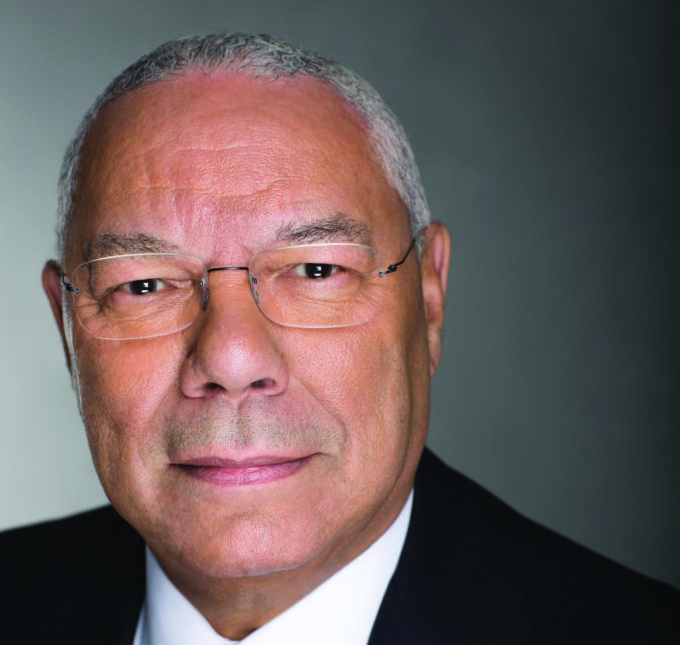
Before they were placed into board service to protect assets of shareholders at some of the largest publicly traded corporations on the S&P 500, a phalanx of BLACK ENTERPRISE Registry of Corporate Directors members chose military service to secure our nation. After their tours of duty, many of these black veterans applied their leadership and strategic skills to advance in corporate America while some decided to build distinguished careers in the Armed Forces. All, however, were drafted to serve on corporate boards because they consistently exhibited the right stuff when it came to management, decisiveness, and sound judgment.
As you would expect, most of these board members are involved in technology and aerospace and defense—sectors in which equipment and processes, in some cases, have been perfected for military and government use before being modified for consumers. Corporations in other industries have clearly benefitted from leaders who spent years developing detailed plans to ensure successful outcomes and at times have done so with literally lives on the line.
In honor of Veterans Day, we salute Registry members who have proudly represented America in this capacity. Using bio information, we share their military journey. You will be fascinated by this cadre of tops guns, military geniuses, and inspirational heroes—all bound by patriotism, sacrifice, and honor.
Gen. Colin Powell
The most prominent among them: Gen. Colin Powell, who rose to become the nation’s first African American Chairman of the Joint Chief of Staff—the pinnacle position in the Armed Forces—as well as the first African American to head the diplomatic corps as Secretary of State. The retired four-star Army general “found his calling” while attending the City College of New York, where he studied geology and joined the Reserve Officers’ Training Corps (ROTC). Serving as the commander of his unit, he has often been quoted saying that the opportunity helped provide him with structure and direction. After graduating in 1958, Powell was commissioned as a second lieutenant in the U.S. Army. In the 1960s, he served two tours of duty in Vietnam and has been awarded as many 11 military decorations in all.

After receiving an M.B.A. at George Washington University and gaining a White House fellowship in 1972, he would serve four presidents, holding positions in the Defense department and at the Pentagon, involved in the coordination of military campaigns over the course of three decades that included the bombing of Libya and both Iraq Wars.
Powell currently serves on the board of Salesforce.com.
Gen. Lloyd J. Austin III
Gen. Lloyd J. Austin III is a retired U.S. Army General with nearly 41 years of military service and extensive operational experience, having commanded troops in combat at the 1-, 2-, 3- and 4-star levels. As the Commander of U.S. Central Command from March 2013 through March 2016, he was responsible for the 20-country Central Region that includes Iraq, Syria, Iran, Yemen, Afghanistan, Pakistan, Egypt, and Saudi Arabia. He was also the Combined Forces Commander in Iraq and Syria.

Austin is the Class of 1951 Leadership Chair for the Study of Leadership in the Department of Behavioral Sciences & Leadership at the U.S. Military Academy at West Point, New York for the academic years 2016-17 and 2017-18. A graduate of the U.S. Military Academy with master’s degrees from Auburn University in Education and Webster University in Business Management, he holds numerous awards and decorations, including five Defense Distinguished Service Medals, the Silver Star, and the Legion of Merit.
Austin is a corporate director on the board of Nucor Corporation.
Frank M. Clark Jr.
Frank M. Clark Jr. has been president of the Chicago Board of Education since 2015 and served as chairman and CEO of Commonwealth Edison Co. (also known as ComEd), an affiliate of Exelon Corp., from 2005 to 2012. He has held various positions at the company, ranging from governmental and community affairs to distribution services and marketing. As such, he has cemented his reputation as one of the most versatile leaders in the energy sector.

Black Veterans
The only time he did not work for the company during his 45-year career was when he was drafted in 1967, shortly after being hired for a mailroom position. He served two years in the U.S. Army, including a year in Vietnam. Once his tour was over, Clark returned to work at ComEd and at the same time, went back to school to earn bachelor and law degrees from DePaul University.
Clark serves on the boards of Waste Management Inc. and Aetna Inc.
Major Gen. Augustus Leon Collins
From his bio on Huntington Ingalls Industries’ site: “Collins served in the U.S. Army and Mississippi National Guard for more than 35 years and held numerous command and staff positions, including command of the Mississippi National Guard’s 155th Brigade Combat Team, which deployed to Iraq and was responsible for security operations in the southern and western provinces.

Collins was promoted to brigadier general in 2005 and is the first African-American to attain the rank of general in the history of the Mississippi National Guard. He retired in 2016 after serving five years as the adjutant general of both the Mississippi Army National Guard and the Mississippi Air National Guard.”
Collins serves on the board of Huntington Ingalls Industries Inc.
Major Gen. Elder Granger
Major Gen. Elder Granger is currently president and CEO of The 5Ps L.L.C., a Centennial, Colorado, healthcare, education, and leadership consulting organization. Prior to his retirement from the US Army in 2009, Granger served as the deputy director and program executive officer of the TRICARE Management Activity, Office of the Assistant Secretary of Defense (Health Affairs), for close to a half-decade. In that role, he was a principal adviser to the Assistant Secretary of Defense (Health Affairs) on the department’s health plan policy and performance and oversaw the acquisition, operation, and integration of its managed care program within the Military Health System. Engaged in planning, budgeting, and execution of the $22.5 billion Defense Health Program, Granger managed a staff of 1,800 to ensure high-quality, accessible healthcare for 9.2 million uniformed service members, their families, retirees, and other stakeholders worldwide.
Prior to TRICARE, Granger led the largest U.S. and multinational battlefield health system while serving as Commander, Task Force 44th Medical Command and Command Surgeon for the Multinational Corps Iraq.

A graduate of Arkansas State University in 1976 and the University of Arkansas School of Medicine in 1980, Granger began his military career commissioned through ROTC. Over 40 years, the military physician, board-certified by the American Board of Internal Medicine and the Board of Hematology and Oncology, rose through the ranks, gaining a series of surgical assignments and leadership roles. Among his numerous awards, decorations, and honors: The Defense Superior Service Medal, the Legion of Merit with three oak leaf clusters, the Bronze Star Medal, and the Meritorious Service Medal with four oak leaf clusters.
Granger currently serves on the board of Express Scripts Holding Co.
Anthony W. Hall Jr.
Anthony W. Hall Jr. has been known as the “people’s lawyer” in the H for decades. As City Attorney during Houston Mayor Lee Brown’s administration. from 1998 to 2004, and then played the role of chief administrative officer for the next mayor from 2004 to 2010. Since then, Hall, who has an economics degree from Howard University and a law degree from the Thurgood Marshall School of Law at Texas Southern University, handles cases through his private practice.

Before discovering law and government, he served in the U.S. Army from 1967-1971, attaining the rank of captain. Hall’s military service included tours in Berlin and Vietnam in which he was awarded the Purple Heart and three Bronze Stars.
Hall serves on the board of Kinder Morgan Inc.
Gen. Lester L. Lyles
Besides having a mechanical engineering degree from Howard University and master’s in mechanical/nuclear engineering from when he attended school in the 1960s, Gen. Lester L. Lyles studied at Defense Systems Management College, the Armed Forces Staff College, the National War College, and the National and International Security Management Course at Harvard University during the 1980s and 1990s.
Lyles, who entered the U.S. Air Force in 1968 as a distinguished graduate of the Air Force ROTC program, also gained an array of key assignments, including Special Assistant and Aide-De-Camp to the Commander of Air Force Systems Command; Avionics Division Chief in the F-16 Systems Program Office; and Program Director of the Medium-Launch Vehicles Program and Space-Launch Systems offices in 1997 during the recovery from the Challenger Space Shuttle accident.

The aforementioned experiences—just a few of the highlights on his extensive résumé—and training prepared Lyles for his biggest role: Commander, Air Force Materiel Command at Wright-Patterson Air Force Base, Ohio in 2000. The command conducts research, development, test and evaluation, acquisition management services and logistics support for the Air Force. In 2012, the retired Lyles was bestowed the General Thomas D. White Award for distinguished service in national security, from the U.S. Air Force Academy.
Lyles is a corporate director on the board of General Dynamics.
Leo S. Mackay Jr.
Leo S. Mackay, Jr. is senior vice president, Internal Audit, Ethics and Sustainability, and an elected corporate officer of Lockheed Martin Corp.
A 1983 graduate of the U.S. Naval Academy, he completed pilot training two years later and graduated at the top of his class. Selected to fly the F-14, he served as a member of Fighter Squadron 11 for three years, conducting operational deployments to the North Atlantic, Mediterranean, and Indian Oceans. He finished Naval Fighter Weapons School—known as “Top Gun”—and compiled 235 carrier landings and 1,000 hours in the F-14. In the 1988 operation, the highly decorated naval aviator was among the U.S. forces sent to protect civilian oil tankers targeted in the Iran/Iraq War.

On the ground, his various assignments and promotions eventually led him to his role as Deputy Secretary of Veterans Affairs from 2001-2003, receiving the Exceptional Service Medal, the VA’s highest honor, for his service. As he made his ascent, Mackay earned a master’s degree, and a Ph.D., in public policy from Harvard University. He is also a member of the Council on Foreign Relations and a member of the Aspen Strategy Group.
Mackay serves on the board of Cognizant Tech Solutions Corp.
Gen. Lloyd W. “Fig” Newton
Gen. Lloyd W. “Fig” Newton is the retired commander of Air Education and Training Command, headquartered at Randolph Air Force Base in Texas. As such, he is responsible for the recruiting, training, and education of Air Force personnel. Newton manages a massive operation: Air Education and Training Command consists of 13 bases, more than 43,000 active duty members and 14,000 civilians.
But as a young man, he made wartime history. Earning a degree in aviation education from Tennessee State University, he was commissioned as a distinguished graduate through ROTC in 1966. After completing pilot training at Williams Air Force Base, Arizona a year later and qualifying as a fighter pilot, he flew 269 combat missions from Da Nang Air Base in South Vietnam, including 79 missions over North Vietnam, the dangerous stronghold of the Viet Cong. Due to his prowess, Newton became the first African American selected to join the elite U.S. Air Force Aerial Demonstration Squadron, the Thunderbirds, in November 1974.

Upon retirement, he entered the corporate world and moved up the ranks to EVP, Military Engines at Pratt & Whitney, the global leader in designing, manufacturing, and servicing of aircraft engines, space propulsion systems, and industrial gas turbines.
Newton currently serves as a corporate director on the boards of L3 Technologies Inc. and Torchmark Corp.
Charles E. Phillips Jr.
As CEO of Infor Global Solutions, Charles E. Phillips Jr. has built the company into an enterprise software giant. Prior to Infor, he was president and board member of Oracle Corp. and during his seven-and-a-half-year tenure, it tripled in size and successfully acquired 70 companies. Before that experience, Phillips was a managing director in the Technology Group at Morgan Stanley, where he was recognized as one of BLACK ENTERPRISE‘s Most Powerful Blacks on Wall Street and an Institutional Investor All-Star for 10 consecutive years. Highly respected in business and economic circles, Phillips also served on the Obama administration’s Economic Recovery Board, led by Paul Volcker.

Holding a degree in computer science from the U.S. Air Force Academy, a JD from New York Law School, and an M.B.A. from Hampton University, Phillips spent some of his formative career years as part of the military. He was a captain in the U.S. Marine Corps in the 2nd Battalion, 10th Marines artillery unit before his career ascent on Wall Street and Silicon Valley. In fact, in 2012 he was invited as the keynote speaker for the Marine Corps’ 237th Birthday Ball where he addressed his unit in which he served while stationed at Camp Lejeune, North Carolina.
Phillips serves on the board of Viacom Inc.
Gen. Larry Spencer
As the Air Force Association’s leading executive, Gen. Larry Spencer manages the group’s staff. He has oversight of the operations of AFA, AFA Veteran Benefits Association, and Air Force Memorial Foundation. He also holds the title of publisher of Air Force Magazine, the official journal for the association’s 94,000 members.
Spencer began his military career in the enlisted ranks and rose to become a four-star general. Receiving his degree in industrial engineering technology from Southern Illinois University, Carbondale. Spencer was then commissioned through Officer Training School in 1980 as a distinguished graduate. He has commanded a squadron, group, and wing, and served as Vice Commander of the Oklahoma City Air Logistics Center. He made military history as the first Air Force officer to serve as the Assistant Chief of Staff in the White House Military Office.

Retiring as a four-star general, Spencer spent over 40 years in the Air Force. His last assignment was as the Vice Chief of Staff of the US Air Force, reaching the second highest-rank in that branch of the armed forces. He presided over the Air Staff and served as a member of the Joint Chiefs of Staff Requirements Oversight Council and Deputy Advisory Working Group. In that role, he assisted the Air Force’s Chief of Staff with organizing, training, and equipping of 690,000 active-duty, Guard, Reserve, and civilian forces home and abroad.
Spencer serves as a corporate director for Whirlpool Corp.
Melvin T. Stith, Ph.D.
An alumnus of Norfolk State University and a member of its Board of Visitors for the past four years, Melvin T. Stith, Ph.D. will assume the role of interim president of his alma mater beginning Jan. 1, 2018. He is also Dean Emeritus, Martin J. Whitman School of Management, Syracuse University and Dean Emeritus, College of Business, Florida State University, respectively. Before climbing the academic ranks as a professional, the Vietnam veteran served in the U.S. Army Military Intelligence Command from 1968 to 1972, achieving the rank of captain.

A native of Jarratt, Virginia, he received his sociology degree from NSU in 1968 and his M.B.A. and Ph.D. in marketing from the Whitman School in 1973 and 1978, respectively.
Stith serves on the board of AFLAC Inc.
Hansel E. Tookes II
Retired, Hansel E. Tookes II had served in various senior executive positions with tech, aerospace and defense conglomerate Raytheon. Joining the company at the turn of the century, he rose quickly, serving as chairman and CEO of Raytheon Aircraft Co. as well as Raytheon International. Before joining the company, he played vital leadership roles at industrial companies United Technologies and Pratt & Whitney.

Before becoming a top gun in corporate America, Tookes was a Lieutenant Commander and Military Pilot in the U.S. Navy for seven years and later served as a Commercial Pilot with United Airlines. Moreover, he holds a degree in physics from Florida State University and a master’s in aeronautical systems from the University of West Florida. He also completed the Advanced Management Program at the Harvard Business School. He served as a member of the Advisory Group to the Secretary of the Air Force and continues his membership of the National Academies – Aeronautics and Space Engineering Board. No longer in military service, Tookes still continues to serve his country.
Tookes is on the boards of NextEra Energy Inc., Corning Inc., Harris Corp., and Ryder System Inc.
The post 13 Black Veterans Who Now Sit on Corporate Boards appeared first on Black Enterprise.
Stay Up to Date

BLAQER Influence: Black 10K Project

Grow Your Small Business: Part 1 – Build Your Brand











